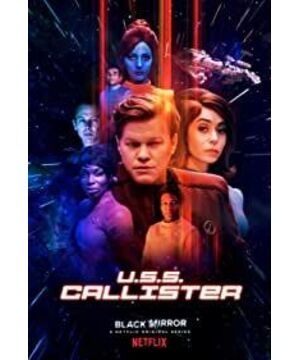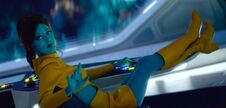Five stars for the sixth story
The value of science fiction works has always lie in its reality.
And "Black Mirror" is the ironic prophecy of this era.
From the Internet bubble in the 1990s to the skyrocketing Bitcoin today, in just 30 years, technology has invaded all aspects of our lives. While providing unprecedented convenience and pleasure, it also brought depression and anxiety.
The products of technological revolution such as Apple mobile phone, WeChat and Alipay have not only changed our way of life, but also impacted our social order and values. The connection anytime, anywhere eliminates the physical distance between people, but creates a new emotional gap. The fast and convenient purchase and payment platform abolished the layers of exploitation by distribution and retailers in the middle, and nourished a hotbed of fraud and a new protection fee tribute mechanism. It was supposed to be the camera of the safety net, but instead turned closed classrooms and even private bedrooms into open resources for everyone to enjoy. Reality is always more absurd than film and television works.
Rather than saying that "Black Mirror" constructs a cold and cruel future world, it is better to say that "Black Mirror" takes out the problems we have vaguely discovered at this moment, and conducts a calm analysis and deconstruction.
Technology goes to the left and humanity goes to the right.
We are stuck in the middle, at a loss as to what to do.
So with "Black Mirror", this evil-like warning prophecy.
6 stories: all about human rights issues
1. Federal Starship Carlist
The first episode continues the setting of the 2014 White Christmas Special, and explores the human rights of copying humans-does copying life that only exist in the virtual world enjoy the most basic rights of being a human being? Is there a substantial difference between the virtual life and the real body? Enslaving or even obliterating the programmer who replicates life, is it really damned?
For the above questions, the screenwriter gave a black and white answer, but we know that there is no single correct answer. From a rational point of view, we will naturally sympathize with the unfortunate fate of being enslaved, and hope that they can gain freedom and happiness. But logically speaking, the programmer was lynched without a legal trial, which seems to be beyond the reasonable scope of self-inflicted punishment.
In ordinary online games, the abuse of NPC players is not a heinous thing. When the target of abuse is upgraded to a copy of life, whether it constitutes a crime worthy of death is still debatable. When the legality of his behavior cannot be defined, the end of the programmer's death is not convincing. It can only be said to be a simple and rude soap opera.
In the classic white Christmas special , the clone accepts his own destiny and obediently gets enslaved by the body. So far, I think about it with extreme horror.
In this episode, the scriptwriter also has the opportunity to use the connection between the game and reality to dig deeper into the relationship between the virtual life and the ontology, instead of lazily using reality as the background board and props for the development of the virtual world story.
If the screenwriter can spend more space on the interaction between the body and the copy after being blackmailed by Yanzhao, then this episode will have the opportunity to open up a new pattern.
2. Ark Angel
The second episode also talks about human rights, the human rights of children.
The mother in the play is afraid that her daughter will be frightened by evil dogs, see bad demonstrations, and even fall in love with bad boys who should not be loved, so she uses the power of technology to imprison her in a false and safe world, step by step in the name of love Push her away.
The mother's protection has become the curse of her daughter: because she is ignorant, she is fearless; because she has never experienced it, she doesn't know how to be afraid and adequate. In the end, because the unsafe scenes were blocked, the daughter beat her mother beyond recognition.
It is precisely because the mother lacks due respect and trust for her daughter from the beginning to the end that she will beg for the sword and miss her chance of normal growth.
This is the most intimate episode of the entire fourth season, because such bloody examples are everywhere around us. Compared with the mother in the play, Chinese parents tend to be inferior. They tend to give their children the best, but they forget to respect and understand.
What they are best at is to stand on a high place and look down and apply blows, instead of letting children try what they want to do, to experience for themselves, hit the south wall, and then comprehend.
"I have eaten more salt than you have eaten!"
"I do it for your own good!"
In a word, it blocked the children's opportunities and simply ignored their wishes.
Therefore, the two generations are full of contradictions and do not understand each other.
Many children have grown up with childhood shadows and scars in their hearts. In fashionable words, this is the injury of the native family. If parents can learn to respect and trust their children with an equal attitude, and let go in time, then many tragedies will not happen.
You see, in this story, everyone is at fault, and the most innocent is technology.
3. Crocodile
The third episode is about the crime story of a misstep, becoming an eternal hate, getting deeper and deeper, and finally sinking into the quagmire. At first glance, it has nothing to do with human rights. But in fact, if you think about it, you will find that it is talking about human rights—the right to use memory.
Memory is arguably our most private property. Each of us is made up of past memories. Memory defines our character and attitude towards life, and it also determines our direction. Therefore, people who have lost their memories are like Piaoping, who can neither tell where they came from nor where they should go.
Allowing others to peep into our memories is like being naked for others to watch. Our most secret emotions, the most obscure embarrassment and evil thoughts are all exposed to the public.
When the words are monitored, the text is monitored, and our every move is under the monitor, we are the worst, and we can think freely.
But when our memories have become display cabinets, when people can watch, where else can we hide?
When I can't even think about it, I am truly desperate.
4. Hanged DJ
The fourth episode still talks about human rights, the right to freely choose a love partner.
One of the hallmarks of modern society is that marriage matters no longer depend on the words of matchmakers and the orders of parents.
In the future society in the story, humans no longer love freely, but rely on intelligent systems to allocate suitable partners. On the surface, it is the perfect match using big data algorithms. In fact, from the beginning of the system, there is no room for them to choose. It just uses the wrong object to keep them trying and making mistakes, killing patience and confidence, and finally forcing them to regard the person they first met as the real man. .
The 99.8% shooting rate was actually decided when they first met. Anyway, going round and round must be wrong. When they are exhausted physically and mentally, finally fighting becomes the only way out, and the person they met at the beginning becomes the only choice. From start to finish, it was just a scam.
Obviously, letting technology decide the spouse is a real step backward rather than forward.
If humans have to leave the mating process to the computer, what face will they continue to survive?
5. Metal head
There are two levels of human rights in the fifth episode. The first level is the right to basic survival, and the second level is the right to pursue spiritual satisfaction.
The wasteland world is not new anymore. "The Hunger Games" and "Moving Labyrinth" became large-scale inspirational scenes of youth idols, "Mad Max 4" was filmed full of primitive hormones, and "Blade Runner 2049" was filmed with philosophies under the smog.
The wasteland world of Black Mirror is simpler and more direct. From beginning to end, there is only one escape character.
The woman tried her best to escape, escaped from the warehouse, climbed the tree, threw off the robot dog, and forced the robot dog to explode, but she still couldn't escape.
The big villain technology, whether it is called Skynet or Tengu, must have a name and a surname. But the screenwriter didn't give any information, not even mentioning how humans landed in this field.
In fact, the screenwriter did not intend to criticize technology at all. Before the last shot appeared, the story was very simple, that is, human beings will never give up to survive. No matter how many dark sides human beings have, how selfishly black and stupid and lazy they are, they will still show a strong desire and will to survive when it comes to life and death.
In the finale, the shots of the teddy bears scattered on the ground are frozen. It is a stroke of magic and brings a second meaning: no matter how difficult it is to survive, even if it is killed, human beings must pursue spiritual comfort and satisfaction.
This is the greatest part of mankind.
Of the six stories, this one seems to be the darkest, but in fact the most beautiful.
6. Dark Museum
In the last episode, there is no doubt that it is about human rights.
The souls living in the monkey dolls and the holographic figures of condemned prisoners who have come back to life are both experimental products and victims of the historical process of "technology" development.
The most frightening thing is that this sacrifice seems inevitable. Without volunteers who eat crabs, technological innovation will only be held back. But in the process of development, who should draw the bottom line of morality, and who should abide by it?
The "crazy scientist" who has no basic morals in the play is not the only perpetrator.
Not to mention the role of the government in these medical experiments. In the first two stories, scientists only played a role in fueling the flames. It was the mediocre doctor and the black husband themselves who made the choice to extinction. In the story of the executed prisoner, if there were not so many tourists and perverts vying to electrocute him, then naturally no one would pay for the madness of scientists. Scientists are never the cause of evil.
So the end of the story just seems to be beautiful, think about it carefully, this is just the death of one person to cover up the corruption of the whole system. Those tourists and perverts who came to electrocute death row prisoners, the black husband and his new love, as well as the funders and government officials who approved or even promoted medical experiments, are still living in peace of mind... and many people are still going forward. Land becomes a new victim.
Technology is not an ugly fig leaf.
Nor is some evil individual.
The ugly thing is the system!
The black mirror universe takes shape
The ambition of Netflix's black mirror is self-evident. The successive exhibits in the Diablo Museum come from stories that have appeared in previous and current seasons: the hanged performance artist in "National Anthem", the executioner and villain accomplice in "White Bear", and Saito in "Game Test" The company’s game equipment, the bed of "Heroes of War", the artificial honey of "Public Enemies of the Whole Net", the broken monitor in "Ark Angel", the bathtub in "Crocodile"...
TCKR is everywhere behind the highly developed technology.
The ubiquitous evil reflects the hypocritical and blind obedience of the public and the dark and complicated hearts of the people.
The Black Mirror universe takes shape, and under this magnificent worldview, there will be more exciting prophetic stories to happen.
View more about USS Callister reviews











